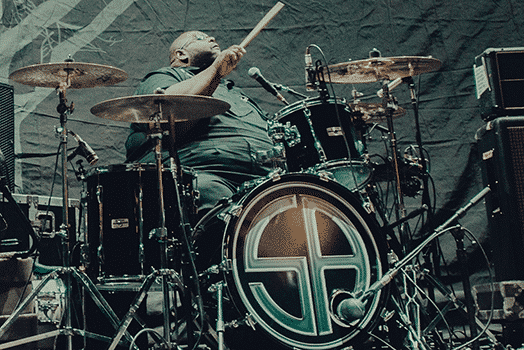Michael Bland Discusses Soul Asylum’s New Album, <i>Hurry Up and Wait</i>

Former Prince drummer Michael Bland has been playing with Soul Asylum since 2005. We tracked him down to talk about the making of Hurry Up and Wait, his fourth album with the beloved Minneapolis rock band.

MD: These songs sound so unfussy in the drum department—they have exactly what they need. Is that a byproduct of telepathy you’ve developed with [bandleader] Dave Pirner, knowing exactly what his songs need?
Michael: Soul Asylum, first and foremost, is a guitar band. The drums on the records have never been particularly flashy. I think part of that has to do with the fact that Dave plays drums as well. His choices are clear and informed, when he’s asking me to do, or not do something. Dave likes it to be kept pretty straightforward. So I generally go with the simplest of choices, and try not to grandstand or bring unnecessary attention to what I’m doing. Advertisement
MD: In “Busy Signals” you pivot nicely from parts with a very open, melodic vocal melody and the sections where the melody is much busier, where you add a martial feel to thesnare part. Are you always looking for spots to play off Dave’s vocal?
Michael: In this case, Dave had laid a scratch drum track down to show me what he was after. I listened for a bit, and then started looking for ways to interject some kind of musical conversation between the lead vocal and main guitar track. I don’t generally try to get in every available space. I just look for spots to make a tasteful statement without cluttering or convoluting the working relationship of everything else. The object is to never interfere, but always enhance.
MD: You’re the longest-tenured drummer in Soul Asylum. How do you feel after fifteen years with the band?
Michael: I’m still interested, very much enthused and proud to be keeping the legacy going. It’s very much a collective, although Dave is our fearless leader. He welcomes constructive criticism and contributions from all. That’s part of what makes it more than a job. We really do work together. Between the band and crew, there’s only 7 of us. I wouldn’t live on a tour bus with anybody else. It’s deeper than business. It’s family. We’re all there to do our very best, work hard and play hard. Advertisement
MD: You’ve played with so many different types of artists over the years. Are there tricks that are applicable in any musical situation?
Michael: No tricks. Just common sense. Know the music. Start out where the last guy left off, and gradually make improvements. Nobody wants you coming in on a mission to totally rewrite the book. Have some reverence for what has come before you, first. Show respect, and then freshen things up. Also, remember that it doesn’t take much to set the music up for better things. Just be more interested in what’s going on around you than into what you’re playing. Have the attitude of a team player. One of the first nuggets of wisdom someone laid on me about drumming professionally was, “A good drummer can make a good band sound great, but a bad drummer can make a great band sound lousy.” If you just keep it steady and musical, you can earn. Be more than a drummer, be a musician. Make choices that elevate the music, not your ego.
Patrick Berkery


